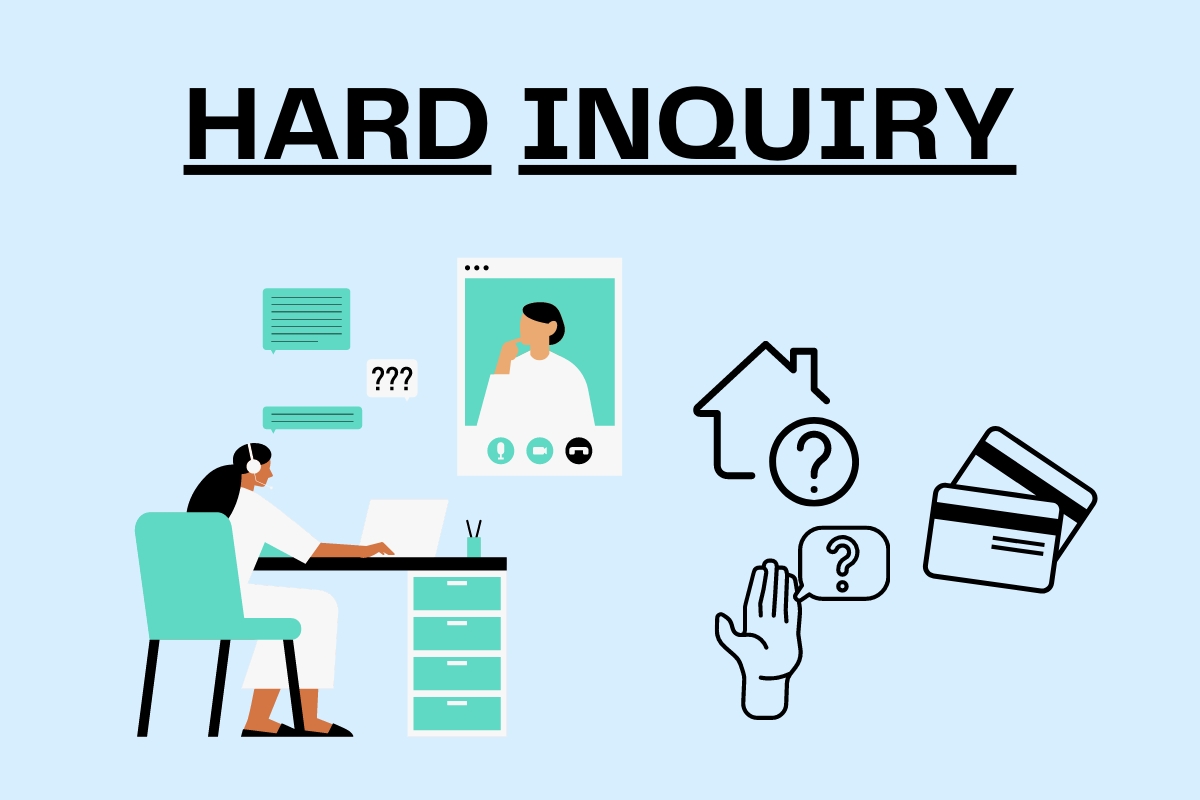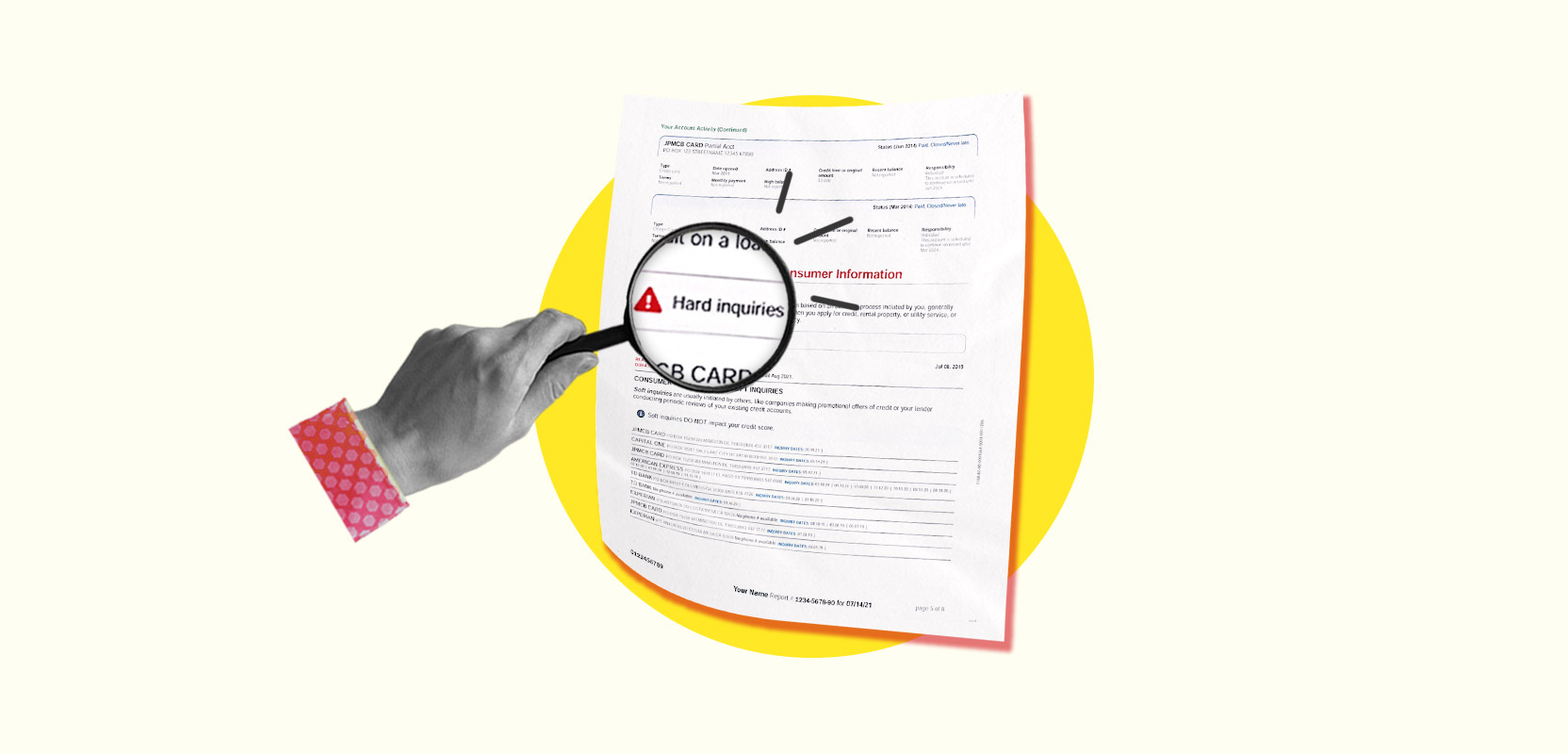

Finance
How To Remove A Hard Credit Inquiry
Published: March 4, 2024
Learn how to remove a hard credit inquiry from your credit report and improve your financial health. Get expert tips and advice on managing your finances effectively.
(Many of the links in this article redirect to a specific reviewed product. Your purchase of these products through affiliate links helps to generate commission for LiveWell, at no extra cost. Learn more)
Table of Contents
Introduction
Welcome to our comprehensive guide on how to remove a hard credit inquiry. A hard credit inquiry, also known as a hard pull, occurs when a potential lender or creditor reviews your credit report as part of their decision-making process. This type of inquiry typically happens when you apply for a loan, credit card, mortgage, or any form of credit. Unlike soft credit inquiries, which occur when a person or company checks your credit report as part of a background check or pre-approval process, hard credit inquiries can affect your credit score and are visible to other creditors.
Understanding the impact of hard credit inquiries and knowing how to remove them is crucial for anyone looking to maintain a healthy credit profile. In this guide, we will delve into the intricacies of hard credit inquiries, explore their impact on your credit score, and provide actionable steps to remove them from your credit report. Whether you're aiming to improve your creditworthiness or rectify inaccuracies, this guide will equip you with the knowledge and strategies to navigate the process effectively.
Navigating the realm of credit inquiries can be complex, but with the right information and approach, you can take control of your credit report and work towards achieving your financial goals. Let's embark on this enlightening journey to understand the nuances of hard credit inquiries and empower ourselves with the tools to address them effectively.
Understanding Hard Credit Inquiries
Hard credit inquiries are an integral part of the credit assessment process and play a significant role in determining an individual’s creditworthiness. When you apply for credit, whether it’s a credit card, auto loan, mortgage, or personal loan, the potential lender will likely request a copy of your credit report from one or more of the major credit bureaus, such as Equifax, Experian, or TransUnion. This request triggers a hard inquiry on your credit report, which is then recorded and factored into your credit score.
It’s important to note that hard inquiries are initiated with the consumer’s consent, typically when they apply for credit. These inquiries provide creditors with insight into an individual’s borrowing history and help them assess the associated risks before extending credit. However, multiple hard inquiries within a short time frame can raise concerns among lenders, as it may indicate a heightened risk of overextension or financial distress.
Hard credit inquiries remain on your credit report for up to two years and are visible to other creditors who review your report. While a single hard inquiry may have a minimal impact on your credit score, a flurry of inquiries within a short period can potentially lower your score and raise red flags for lenders. Understanding the distinction between hard and soft inquiries is crucial, as soft inquiries do not affect your credit score and are typically generated for background checks, pre-approval offers, or credit monitoring purposes.
By comprehending the nature of hard credit inquiries and their implications, individuals can make informed decisions regarding credit applications and minimize the potential impact on their credit scores. Moreover, being aware of the factors that influence credit scoring and lending decisions empowers consumers to proactively manage their credit profiles and pursue their financial objectives with confidence.
The Impact of Hard Credit Inquiries
Hard credit inquiries can have a tangible impact on an individual’s credit score and overall creditworthiness. When a creditor pulls your credit report to assess your creditworthiness, a hard inquiry is generated, and it is factored into your credit scoring model. While the exact impact of a hard inquiry can vary based on individual credit profiles, several key factors determine its influence on credit scores and lending decisions.
One of the primary considerations is the frequency of hard inquiries. If multiple inquiries are made within a short period, it may signal to lenders that the individual is actively seeking credit, potentially raising concerns about financial stability and the ability to manage additional debt responsibly. Consequently, this can lead to a temporary dip in the individual’s credit score.
Furthermore, the presence of numerous hard inquiries on a credit report can also indicate a higher likelihood of default or financial distress, which may affect a lender’s willingness to extend credit or the terms offered. While a single hard inquiry may have a minimal impact, a pattern of multiple inquiries can be perceived as a red flag, potentially influencing lending decisions and the terms of credit extended.
It’s important to note that the impact of hard inquiries on credit scores is not permanent. Over time, as the inquiries age and the individual demonstrates responsible credit behavior, their impact diminishes. Additionally, credit scoring models are designed to account for rate shopping behavior, such as when individuals apply for multiple loans within a short window for the same purpose, such as a mortgage or auto loan. In such cases, these inquiries are typically treated as a single inquiry, minimizing their impact on the individual’s credit score.
By understanding the impact of hard credit inquiries, individuals can make informed decisions regarding credit applications and timing, strategically managing their credit profiles to minimize potential negative effects. Furthermore, being aware of the temporary nature of inquiry impacts can provide reassurance as individuals navigate the credit application process and work towards achieving their financial goals.
How to Remove a Hard Credit Inquiry
Removing a hard credit inquiry from your credit report may seem challenging, but it’s not impossible. While the process requires diligence and persistence, there are actionable steps you can take to address and potentially remove unauthorized or inaccurate inquiries from your credit file. It’s important to approach this endeavor with a clear understanding of your rights as a consumer and the mechanisms available to rectify discrepancies in your credit report.
When seeking to remove a hard credit inquiry, it’s crucial to differentiate between authorized inquiries resulting from legitimate credit applications and unauthorized or erroneous inquiries. Authorized inquiries, resulting from credit applications you initiated, cannot be removed from your credit report. However, unauthorized or inaccurate inquiries, such as those stemming from identity theft or data inaccuracies, can be disputed and potentially removed.
It’s essential to regularly monitor your credit report to identify any unfamiliar or questionable inquiries. This can be done through the annual free credit report available from each of the major credit bureaus or by utilizing reputable credit monitoring services. Upon identifying unauthorized or inaccurate inquiries, the following methods can be employed to address and potentially remove them from your credit report:
- Method 1: Dispute the Inquiry with the Credit Bureau: File a dispute with the credit bureau reporting the unauthorized inquiry. Provide supporting documentation and a clear explanation of why the inquiry is inaccurate or unauthorized. The credit bureau will investigate the matter and remove the inquiry if found to be erroneous.
- Method 2: Negotiate with the Creditor: If you believe that a hard inquiry was made in error or without your consent, you can directly contact the creditor responsible for the inquiry. Request that they retract the inquiry from your credit report, providing evidence to support your claim.
- Method 3: Wait for the Inquiry to Fall Off: Hard inquiries remain on your credit report for up to two years. While this may seem like a lengthy period, the impact of inquiries diminishes over time, and their influence on your credit score lessens as they age. Patience and responsible credit management can contribute to the gradual mitigation of inquiry-related effects.
By leveraging these methods and maintaining proactive credit monitoring, individuals can take control of their credit reports and address unauthorized or inaccurate inquiries effectively. While the process may require time and effort, the potential impact on credit scores and overall creditworthiness makes it a worthwhile endeavor for those seeking to maintain a healthy credit profile.
Method 1: Dispute the Inquiry with the Credit Bureau
When confronting an unauthorized or inaccurate hard credit inquiry, initiating a dispute with the credit bureau responsible for reporting the inquiry is a proactive and essential step in rectifying the issue. The Fair Credit Reporting Act (FCRA) grants consumers the right to dispute any information on their credit reports that they believe to be inaccurate or unauthorized, including hard inquiries.
To commence the dispute process, obtain a copy of your credit report from the relevant credit bureau, where the unauthorized inquiry is documented. Review the report thoroughly, identifying the specific inquiry in question and gathering any supporting evidence that substantiates its inaccuracy or unauthorized nature. This evidence may include documentation proving that you did not initiate the credit application associated with the inquiry or that it resulted from identity theft.
Upon gathering the necessary documentation, file a dispute with the credit bureau, either online or in writing, clearly outlining the details of the inquiry and the reasons for disputing its accuracy or legitimacy. It’s crucial to provide as much specific information as possible and include any supporting documentation to bolster your case. The credit bureau is then obligated to investigate the matter by contacting the entity that initiated the inquiry, such as a creditor or lender.
During the investigation, the credit bureau will request that the entity providing the information, known as the furnisher, verify the accuracy and legitimacy of the inquiry. If the furnisher fails to substantiate the inquiry within a reasonable timeframe, typically 30 days, the credit bureau is required to remove the inquiry from your credit report. Additionally, the credit bureau will provide you with a free copy of your updated credit report reflecting the changes made as a result of the dispute.
It’s important to monitor the progress of the dispute and follow up with the credit bureau if necessary. In the event that the inquiry is not removed following the initial dispute, you have the right to escalate the matter by submitting a formal complaint to the Consumer Financial Protection Bureau (CFPB) or seeking legal counsel to address any violations of your consumer rights under the FCRA.
By leveraging the dispute process and exercising your rights as a consumer, you can take proactive measures to address unauthorized or inaccurate hard credit inquiries, safeguarding the integrity of your credit report and mitigating potential adverse effects on your credit score and overall creditworthiness.
Method 2: Negotiate with the Creditor
When faced with an unauthorized or erroneous hard credit inquiry, engaging directly with the creditor responsible for the inquiry presents an opportunity to address the issue at its source. This method involves initiating a dialogue with the creditor, presenting your case, and seeking their cooperation in retracting the unauthorized inquiry from your credit report. While it may require persistence and thorough documentation, negotiating with the creditor can yield positive outcomes in rectifying inaccurate inquiries.
Initiating the negotiation process entails identifying the creditor associated with the unauthorized inquiry and gathering pertinent evidence to support your claim. This evidence may include records of communication regarding the credit application, documentation proving that you did not authorize the inquiry, or evidence of identity theft, if applicable. It’s essential to approach the negotiation process with a clear and compelling case, supported by factual evidence that substantiates the unauthorized nature of the inquiry.
Upon gathering the necessary documentation, reach out to the creditor via written correspondence or phone communication, clearly articulating the details of the unauthorized inquiry and providing the supporting evidence. Express your concern regarding the impact of the inquiry on your credit report and emphasize the importance of its retraction to ensure the accuracy and integrity of your credit profile.
During the negotiation, it’s crucial to maintain a professional and assertive demeanor, clearly outlining your position while remaining open to constructive dialogue. Be prepared to provide any additional documentation or information requested by the creditor to facilitate their review and resolution of the matter. Additionally, documenting all communication and maintaining records of correspondence with the creditor is essential to track the progress of the negotiation and substantiate your efforts in seeking resolution.
If the creditor acknowledges the error or unauthorized nature of the inquiry, they may take the necessary steps to retract it from your credit report. However, in cases where the creditor is uncooperative or disputes your claim, you may consider escalating the matter by seeking assistance from consumer protection agencies, such as the Consumer Financial Protection Bureau (CFPB), or consulting legal counsel to explore further options for resolution.
By engaging in constructive negotiation with the creditor and presenting a compelling case supported by evidence, individuals can pursue the retraction of unauthorized or erroneous hard credit inquiries, contributing to the accuracy and integrity of their credit reports and overall creditworthiness.
Method 3: Wait for the Inquiry to Fall Off
Patience and the passage of time can also play a significant role in addressing hard credit inquiries. While the process of waiting for inquiries to naturally fall off your credit report may not provide immediate resolution, it can be a practical approach, especially when dealing with authorized inquiries that are accurate but may be impacting your credit score.
Hard inquiries typically remain on your credit report for up to two years from the date they were initiated. During this period, their impact on your credit score gradually diminishes, especially as you demonstrate responsible credit behavior and maintain a positive payment history. As the inquiries age, their influence on your credit score lessens, and lenders may place less emphasis on them when making credit decisions.
It’s important to note that while waiting for inquiries to fall off can be a passive approach, it is complemented by actively managing other aspects of your credit profile. This includes making timely payments, maintaining low credit utilization, and managing existing credit accounts responsibly. By focusing on these proactive credit management strategies, you can mitigate the impact of inquiries and work towards improving your creditworthiness over time.
Furthermore, as hard inquiries age and eventually fall off your credit report, you may experience a gradual improvement in your credit score, particularly if there are no other significant negative factors impacting your credit profile. This improvement can contribute to enhanced credit opportunities and more favorable terms when seeking new credit or loans.
While waiting for inquiries to naturally expire, it’s important to regularly monitor your credit report to ensure the accuracy of the information contained within it. This allows you to identify any discrepancies or unauthorized inquiries that may require further action, such as initiating a dispute with the credit bureau or engaging with the creditor responsible for the inquiry.
By adopting a patient and proactive approach while waiting for hard inquiries to fall off, individuals can navigate the temporary impact of inquiries on their credit scores and work towards strengthening their credit profiles through responsible credit management and positive financial habits.
Conclusion
Addressing hard credit inquiries is a vital aspect of managing one’s credit profile and pursuing financial goals. Whether contending with unauthorized inquiries, seeking resolution for inaccuracies, or aiming to mitigate the impact of legitimate inquiries, individuals have several avenues to navigate this aspect of their credit reports effectively.
Understanding the distinction between hard and soft credit inquiries, as well as their implications, empowers consumers to make informed decisions when applying for credit and to proactively manage their credit profiles. By recognizing the factors that influence the impact of inquiries on credit scores and lending decisions, individuals can take strategic steps to address unauthorized or inaccurate inquiries and minimize their influence on creditworthiness.
The actionable methods outlined in this guide, including disputing inquiries with credit bureaus, negotiating with creditors, and patiently waiting for inquiries to fall off, provide individuals with a comprehensive toolkit to address hard credit inquiries. Whether pursuing the removal of unauthorized inquiries or strategically managing the impact of legitimate inquiries, these methods offer avenues for resolution and empowerment.
Furthermore, maintaining regular credit monitoring and actively managing other aspects of one’s credit profile, such as payment history and credit utilization, contributes to a holistic approach to credit management. By integrating these proactive strategies, individuals can work towards enhancing their creditworthiness and accessing favorable credit opportunities.
As individuals navigate the complexities of their credit reports, it’s essential to leverage the available resources and mechanisms to address concerns related to hard credit inquiries. By exercising their rights as consumers, engaging in constructive dialogue with creditors, and adopting a patient yet proactive approach, individuals can safeguard the accuracy and integrity of their credit profiles, ultimately contributing to their financial well-being.
In conclusion, the knowledge and strategies shared in this guide empower individuals to address hard credit inquiries effectively, fostering confidence and control in managing their credit reports and pursuing their financial aspirations.














